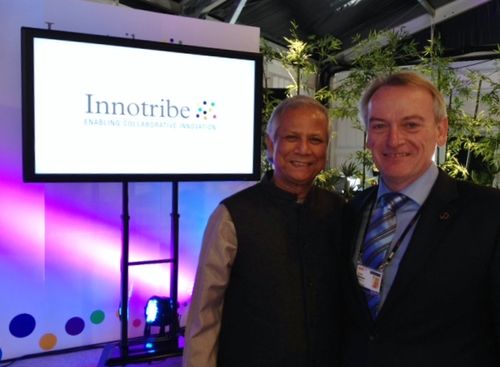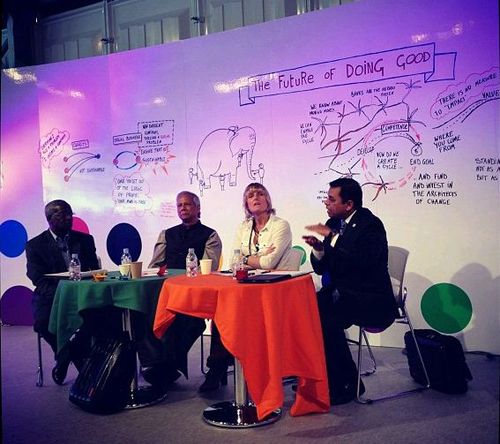
There are few people you meet in life that are
inspirational, but I’ve been lucky enough to meet a few. I won’t namedrop, as most of them you won’t
know, but many of the most inspirational business people I’ve met are in the
innotribe stream.
Today, we were all a little starstruck therefore when even
the whole innotribe team were finding themselves in the presence of Professor Muhammad
Yunus, Chairman of the Yunus Centre and the founder of Grameen Bank.
He joined a panel discussion alongside:
- Julius
O. Akinyemi, Entrepreneur-In-Residence, Massachusetts Institute of
Technology - Kartik
Kaushik, Managing Director, Global Head of Business Development, Citi - Carolyn
Stephens, Professor (PhD, FFPH, IFRSM) , Universidad Nacional de
Tucuman/UCL
in a session entitled: “The
Future of Doing Good (Banks for a Better World)”.
Professor Yunus made many comments
that were quotable. Here are a few:
“On microfinance, some people are critical of this, because some
people are making money for themselves. When we created Grameen Bank, the whole
idea was to help people and stop people being victims of loan sharks. Those people creating microfinance and making
money from it are not doing it in the right way. I now have sixty such companies around the
world and have to explain again and again that I do not get any money out of
this. That was not my intention. My intention was to solve problems. That is what I do. These businesses are done for shareholders, and
is focused upon solving problems. It’s a
non-dividend company however, so the shareholders do not take any money out of
it, but this is not charity. It’s a charitable
project that we expect will repay. The problem
with charity is that it goes out and it never comes back. We take the approach that it’s not charity,
it’s business. Money goes out and, over
time, it will come back. That’s our
social business model. It takes out the
focus of making money. The logic of
profit is ridiculous. Instead we design
our business to solve problems and know that, if you solve problems, eventually
you get the money back.”
He continued later to talk about how to solve poverty:
“Poverty is not created by people, it's created by the
system and banking is part of that system. You lend to the people who have
money and don't lend to those people who have no money. Isn't that the wrong
way around? You decide if people are
worthy of credit. Shouldn't we ask instead if banks are worthy of people?”
Great stuff.
The other panellists made some great input too, with Julius
saying that: “social entrepreneurship is no different to normal business,
except that it has passion, innovation and creativity. A social business is not a non-profit or a
giveaway. Anything that does not have a value,
means that people do not value it. Social
businesses are rather businesses in the real sense. The reason why it fails in the private industry
is due to the profit focus however. We can
build social businesses on a profit platform, but it has to start with the
right focus.
My favourite quote of the whole session came from Doctor and
Professor Carolyn Stephens, who opened with the statement: “in medicine we also
have the equivalent of investment bankers.
They are called plastic surgeons.”
It got a big laugh and then it was opened to a lengthy debate
about how to make banking work for the good of the planet.
That’s what innotribe is all about: looking for a positive
future.
If you missed it, then you really missed out, not only on an
inspirational week but also the chance to meet a great man.

Thank you Professor Yunus, and now a quick walk around the
exhibits before the final innotribe sessions: the startup challenge.
Chris M Skinner
Chris Skinner is best known as an independent commentator on the financial markets through his blog, TheFinanser.com, as author of the bestselling book Digital Bank, and Chair of the European networking forum the Financial Services Club. He has been voted one of the most influential people in banking by The Financial Brand (as well as one of the best blogs), a FinTech Titan (Next Bank), one of the Fintech Leaders you need to follow (City AM, Deluxe and Jax Finance), as well as one of the Top 40 most influential people in financial technology by the Wall Street Journal's Financial News. To learn more click here...





















